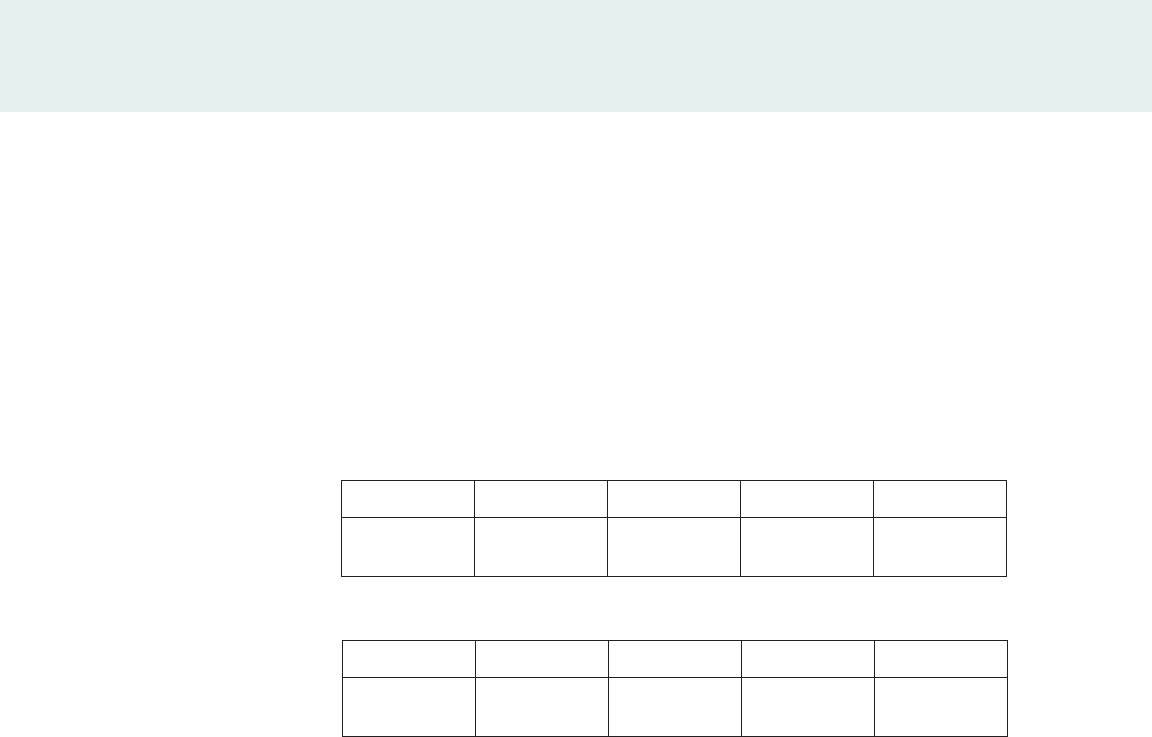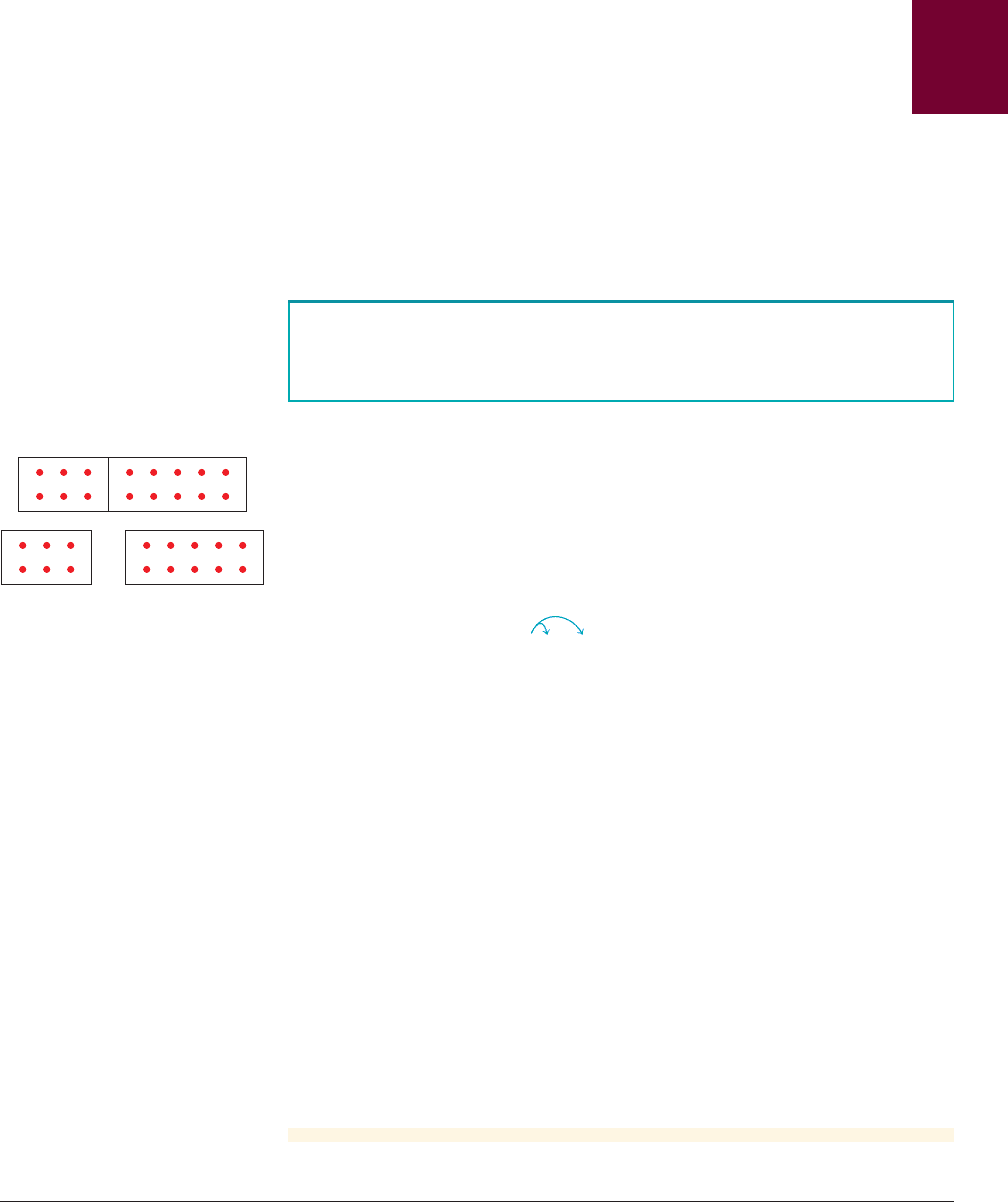Stewart J. College Algebra: Concepts and Contexts
Подождите немного. Документ загружается.


634 CHAPTER 7
■
Systems of Equations and Data in Categories
TEST
1. Find all solutions of the linear system:
2. In hours an airplane travels 600 miles against the wind. It takes 50 minutes to travel
300 miles with the wind. Find the speed of the wind and the speed of the airplane in
still air.
3–5
■ A system of linear equations is given.
(a) Find the complete solution of the system, or show that there is no solution. You
may use either Gaussian elimination or the reduced row-echelon form of the
augmented matrix of the system (using a graphing calculator).
(b) State whether the system is inconsistent, dependent, or neither.
3.
4.
5.
6. Anne, Barry, and Cathy enter a coffee shop.
■
Anne orders two coffees, one juice, and two doughnuts and pays $6.25.
■
Barry orders one coffee and three doughnuts and pays $3.75.
■
Cathy orders three coffees, one juice, and four doughnuts and pays $9.25.
Find the price of coffee, juice, and doughnuts at this coffee shop.
7. Let A, B, C, and D be the given matrices. Carry out the indicated operations, or explain
why they cannot be performed.
(a) (b) (c) 3D
(d) BC (e) AD (f) DA
8. A system of linear equations is given:
(a) Write the system as a matrix equation of the form .
(b) Find and solve the system by multiplying both sides of the matrix equation
by .A
-1
A
-1
AX = B
e
4x - 3y = 10
3x - 2y = 30
B - CA + B
A = £
1
0
4
§
B = £
2
1
2
01
1 - 1
§C = £
- 32
3
2
1
- 20
§D = £
10 1
01 0
20- 2
§
c
2x - y + z = 0
3x + 2y - 3z = 1
x - 4y + 5z =-1
c
x - y + 9z =-8
-4z = 7
3x - y + z = 5
c
x + 2y + z = 3
x + 3y + 2z = 3
2x + 3y - z = 8
2
1
2
e
3x + 5y = 4
x - 4y = 7
CHAPTER
7

SECTION 7.1
■
Systems of Linear Equations in Two Variables 635
EXPLORATIONS
■
EXPLORATIONS
■
EXPLORATIONS
■
EXPLORATIONS
Collecting Categorical Data
OBJECTIVE To experience the process of collecting categorical data and then
organizing the data in a matrix.
A society is made up of many individuals. Since each individual is unique, how can
we obtain useful information about a society as a whole? Many surveys are con-
ducted each year to learn of different trends or changes in the makeup of a society.
These surveys seek to place individuals in broad categories—for example, categories
of income, education, political affiliation, and so on. One of the most famous such
surveys is the General Social Survey (GSS) conducted every other year by the
University of Chicago. The survey collects data on demographic characteristics and
attitudes of residents of the United States. The results of the survey are available to
the public over the Internet. The data are widely used by sociologists for detecting
social changes and trends in the population of the United States.
In this exploration we experience the process of collecting categorical data on a
somewhat smaller scale—from our classmates.
I. Collecting Data
To collect data from our classmates, we take a survey.
1. Make a survey that asks any two of the following questions. (Each of the
questions has categorical responses.) Or make up your own questions; you can
get ideas on other questions to ask by viewing the questionnaire from the
General Social Survey on the Internet. Note that each survey question can be
answered in several categories (let’s call them (a), (b), (c), (d), . . .).
■
How many children are in your family? (2 or fewer, between 3 and 5
(inclusive), more than 5)
■
What do you think is the ideal number of children in a family? (0, 1, 2, 3, 4
or more).
■
Are you happy with your schoolwork so far? (happy, neutral, unhappy)
■
How do you get information about events in the news? (newspapers,
magazines, Internet, TV, radio)
■
How do you think the courts deal with criminals? (too harshly, just right, not
harshly enough)
■
How well informed are you about economic policy? (very informed,
somewhat informed, uninformed)
■
How well informed are you about foreign policy? (very informed,
somewhat informed, uninformed)
■
How well informed are you about global warming? (very informed,
somewhat informed, uninformed)
■
How much would it bother you if polar bears became extinct? (a great deal,
somewhat, very little, not at all)
■
How much would it bother you if sea levels rose by more than 20 feet? (a
great deal, somewhat, very little, not at all)
■
Do you think the universe began with a huge explosion? (yes, no, don’t know)
Christopher Futcher/Shutterstock.com 2009
1
EXPLORATIONS 635

II. Organizing the Data
We can report the data for each question separately, by reporting the number of re-
ponses for each response category [(a), (b), (c), (d), . . .]. Or we can relate the re-
sponses to the two questions by putting the results in a crosstab matrix. From this
matrix we can find out, for example, the number of respondents who answered (a)
to Question 1 and (c) to Question 2.
1. Report the result of your survey for each question separately. First, state each
question, and then report the number of students who answered (a), (b), (c), or
(d) for that question.
(a) (b) (c)
p
Number of
respondents
(a) (b) (c)
p
Number of
respondents
Question 1 ____________________________________________________
2. Use your surveys to make a cross-tab matrix of the answers to Questions 1
and 2.
Question 1
(a) (b) (c)
3. Let’s make a proportion matrix of the results of the survey.
(a) Express each entry in the matrix in Question 3 as a proportion of the
column total. Call the resulting matrix P.
(b) What does the (1, 1) entry in matrix P represent? What about the (2, 3)
entry?
Question 1
(a) (b) (c)
P = ≥
ⵧⵧⵧ
p
ⵧⵧⵧ
p
ⵧⵧⵧ
p
ooo
¥
TTT
p
A = ≥
ⵧⵧⵧ
p
ⵧⵧⵧ
p
ⵧⵧⵧ
p
ooo
¥
TTT
p
636 CHAPTER 7
EXPLORATIONS
■
EXPLORATIONS
■
EXPLORATIONS
■
EXPLORATIONS
Question 2 ____________________________________________________
(a)
(b)
(c)
o
d
d
d
Question 2
(a)
(b)
(c)
o
d
d
d
Question 2

(c) Use the entries in matrix P to state some conclusions that you can draw
from your survey. (For example, you might find that 20% of those who
think the universe began in a big explosion don’t care at all if polar bears
become extinct.)
Will the Species Survive?
OBJECTIVE Learn to use a transition matrix to predict population distributions for
future generations.
To study how species survive, scientists model species populations by observing the
different stages in the life of the particular species. For example, in modeling a pop-
ulation of howler monkeys in Mexico, scientists identified three distinct stages in the
life of these monkeys: immature, juvenile, and adult.*
In general, scientists consider the stage at which an animal is fertile, the pro-
portion of the population that reproduces, the proportion of the young that survives,
the proportion of juveniles that survives to adulthood, and so on. All this information
is conveniently stored in a matrix, called a transition matrix. By using the transition
matrix, it is possible to predict population distribution in future seasons.
Modeling populations in this way is one of the most powerful tools in conser-
vation biology. It helps scientists assess threats to species survival and intervene to
reduce the risk of extinction.
I. A Transition Matrix
For a certain species there are three stages: immature, juvenile, and adult. An animal
is considered immature for the first year of its life, juvenile for the second year, and
an adult from then on. Conservation biologists have collected the field data for this
species recorded in the matrix below.
The entries in matrix P indicate the proportion of the population that survives to
the next year. For example, the first column describes what happens to the immature
population after 1 year.
Year 0
Immature Juvenile Adult
■
The (1, 1) entry is 0.0. This indicates that none of the immature remain
immature.
■
The (2, 1) entry is 0.1. This indicates that 10% of the immature survive to
become juveniles.
P = £
0.0 0.0 0.4
0.1 0.0 0.0
0.0 0.3 0.8
§
TTT
2
Christopher Marin/Shutterstock.com 2009
*Salvador Mandjano and Louis A. Escobedo-Morales, “Population Viability Analysis of Howler
Monkeys (Alouatta paliata mexicana) in a Highly Fragmented Landscape in Los Tuxtlas, Mexico,”
Tropical Conservation Science, 1: 43–62, 2008.
EXPLORATIONS 637
EXPLORATIONS
■
EXPLORATIONS
■
EXPLORATIONS
■
EXPLORATIONS
Immature
Juvenile
Adult
d
d
d
Year 1
Howler monkeys

■
The (3, 1) entry is 0.0. This indicates that none of the immature become
adults (of course, because they first have to become juveniles).
1. Describe each entry in the Juvenile column.
■
The (1, 2) entry is 0.0. ______________________________________________
_______________________________________________________________
■
The (2, 2) entry is 0.0. __________________________________________
_______________________________________________________________
■
The (3, 2) entry is 0.3. ___________________________________________
_______________________________________________________________
2. Describe the entries in the Adult column.
■
The (1, 3) entry is 0.4. ___________________________________________
_______________________________________________________________
■
The (2, 3) entry is 0.0. ___________________________________________
_______________________________________________________________
■
The (3, 3) entry is 0.8. ___________________________________________
_______________________________________________________________
II. Predicting Population
The population of the above species in Year 0 is given in the column matrix :
Let , , , and so on.
1. Find matrices , , , and .
X
4
=
PX
3
=
£
0.0 0.0 0.4
0.1 0.0 0.0
0.0 0.3 0.8
§£
§= £
§
X
3
=
PX
2
=
£
0.0 0.0 0.4
0.1 0.0 0.0
0.0 0.3 0.8
§£
§= £
§
X
2
=
PX
1
=
£
0.0 0.0 0.4
0.1 0.0 0.0
0.0 0.3 0.8
§£
§= £
§
X
1
=
PX
0
=
£
0.0 0.0 0.4
0.1 0.0 0.0
0.0 0.3 0.8
§£
600
400
3500
§= £ §
X
4
= PX
3
X
3
= PX
2
X
2
= PX
1
X
1
= PX
0
X
3
= PX
2
X
2
= PX
1
X
1
= PX
0
X
0
= £
600
400
3500
§
X
0
638 CHAPTER 7
EXPLORATIONS
■
EXPLORATIONS
■
EXPLORATIONS
■
EXPLORATIONS
This indicates that no juveniles become immature.
This indicates that
This indicates that
This indicates that
This indicates that
This indicates that
Immature
Juvenile
Adult
d
d
d

2. (a) Explain why matrix predicts the population in Year 1.
(b) Explain why matrix predicts the population in Year 2.
(c) Do you detect any population trends from the predictions you made in
Question 1?
3. Show that ,,,, . . . .
4. Use the observation in the preceding example and a graphing calculator to
predict the population of the species in Year 50 (that is, find ).
Does it appear that this species will survive?
III. Management of the Environment
Suppose that proper management of the environment has resulted in an enhanced
habitat for the species. In this more appropriate habitat the proportion of immatures
that become juveniles each year increases to 0.3 (from 0.1), the proportion of juve-
niles that become adults increases to 0.7 (from 0.3), and the proportion of adults that
survives to the next year increases to 0.95 (from 0.80). All other proportions in ma-
trix P on page 637 remain the same.
1. Find the new transition matrix P for the population of this species in the
improved environment.
Immature Juvenile Adult
2. Suppose that the population of the species in year 0 is given by the same
column matrix as in Part I. Predict the population of the species in Year 50
(that is, find ). Does it now appear that this species will survive?X
50
= P
50
X
0
X
0
P = £
0.0 0.0 0.4
0.0 0.0
0.0
§
TTT
X
50
= P
50
X
0
X
4
= P
4
X
0
X
3
= P
3
X
0
X
2
= P
2
X
0
X
1
= PX
0
X
2
X
1
EXPLORATIONS 639
EXPLORATIONS
■
EXPLORATIONS
■
EXPLORATIONS
■
EXPLORATIONS
Immature
Juvenile
Adult
d
d
d
To calculate a power of a matrix
on a T1 graphing calculator, use
the usual power key: . For
example, A
50
is entered as [A]^50.
^

T1
Algebra Toolkit A
Working with Numbers
A.1 Numbers and Their Properties
A.2 The Number Line and Intervals
A.3 Integer Exponents
A.4 Radicals and Rational Exponents
2
A.1 Numbers and Their Properties
■
Operations on Real Numbers
■
The Distributive Property
■
The Distributive Property: Expanding
■
The Distributive Property: Factoring
Let’s review the types of numbers that make up the real number system. We start with
the natural numbers
The integers consist of the natural numbers together with their negatives and 0:
The rational numbers are ratios of integers. So the following are rational numbers:
(Recall that division by 0 is always ruled out, so expressions such as and are un-
defined.) There are also real numbers, such as , that cannot be expressed as a ra-
tio of integers and are therefore called irrational numbers. The real numbers con-
sist of all the different types of numbers together.
12
3
0
0
0
1
2
-
3
7
46 =
46
1
0.17 =
17
100
p , - 3, - 2, - 1, 0, 1, 2, 3, 4, p
1, 2, 3, 4, p
The different types of numbers were
invented to meet specific needs. For
example, natural numbers are
needed for counting, negative
numbers for describing debt or
below zero temperatures, rational
numbers for concepts such as “half
a gallon of milk,” and irrational
numbers for measuring certain
distances, such as the diagonal of a
square.
2
■ Operations on Real Numbers
Real numbers can be combined by using the familiar operations of addition, sub-
traction, multiplication, and division. When we multiply two numbers together, each
of the numbers is called a factor of the product. When we add two numbers together,
each number is called a term of the sum.
2 ⫻ 32 ⫹ 3
Factors
Terms

T2 ALGEBRA TOOLKIT A
■
Working with Numbers
example
1
Evaluating an Arithmetic Expression
Evaluate the expression.
(a)
(b)
Solution
(a) First we evaluate the expression inside the parentheses, remembering that
multiplication is performed before addition.
Perform multiplication inside parentheses
Perform addition inside parentheses
Calculate
(b) First we evaluate the expressions inside parentheses. The numerator and
denominator of the quotient are treated as if they are inside parentheses:
Perform operations in fraction
Perform division
Perform addition inside parentheses
Calculate
■ NOW TRY EXERCISE 7 ■
= 70
= 10172
= 1013 + 42
10 a
8 + 10
2
#
3
+ 4b= 10 a
18
6
+ 4b
= 77
= 71112
7 12
#
3 + 52= 716 + 5 2
10 a
8 + 10
2
#
3
+ 4b
712
#
3 + 52
An expression involving numbers and operations on these numbers is called an
arithmetic expression. For instance, the expressions in the next example are arith-
metic expressions. When evaluating arithmetic expressions that contain several of
these operations, we use the following conventions to determine the order in which
the operations are performed:
1. Perform operations inside parentheses first, beginning with the innermost pair.
In dividing two expressions, the numerator and denominator of the quotient
are treated as if they are within parentheses.
2. Perform all multiplications and divisions, working from left to right.
3. Perform all additions and subtractions, working from left to right.
2
■ The Distributive Property
We know that , , and so on. In algebra we express all
these (infinitely many) facts by using letters to stand for numbers: If a and b stand
for any two numbers, then .
We also know that when we add three numbers, it doesn’t matter which two we
add first. These properties hold for multiplication as well. So for any real numbers
a, b, and c we have the following properties of numbers.
■
Associative Properties: and
■
Commutative Properties: and ab = baa + b = b + a
1ab 2c = a1bc 21a + b 2+ c = a + 1b + c 2
a + b = b + a
5 + 7 = 7 + 52 + 3 = 3 + 2

A.1
■
Numbers and Their Properties T3
In words the distributive property says that “multiplying a number by the sum
of two numbers is the same as multiplying the number by each of the terms in the
sum and adding the result.” The diagram in the margin explains why this property
works when the numbers are positive integers, but the property is true for any real
numbers A, B, and C. When we use this property to multiply a number by a sum of
numbers, we “distribute” the number over the sum. So to multiply , we dis-
tribute the 2 over the sum :
213 + 5 2= 2
#
3 + 2
#
5
3 + 5
213 + 5 2
2(3+5)
2%3 2%5
example
2
Using the Distributive Property
Evaluate directly, and then evaluate it using the Distributive Property.
Check that the answers agree.
Solution
We first perform operations inside the parentheses.
Perform addition inside parentheses
Calculate
Using the Distributive Property, we write
Distributive Property
Calculate
Calculate
We get the same answer in both cases.
■ NOW TRY EXERCISE 19 ■
= 16
= 6 + 10
2 13 + 52= 2
#
3 + 2
#
5
= 16
2 13 + 52= 2182
213 + 52
2
■ The Distributive Property: Expanding
In algebra we use letters to stand for numbers; this allows us to find patterns in
numbers. For example, when we write , we mean that the letters x and y
stand for any real numbers. To expand or “multiply out” , we use the
Distributive Property with , , and :C = 2yB = 3A = x
x
˛ 13 + 2y 2
x˛ 13 + 2y 2
If A, B, and C are any real numbers then
A1B + C 2= AB + AC
The associative and commutative properties tell us that we cannot make a mistake in
the order in which we choose to multiply numbers or in the order in which we choose
to add numbers.
But the really important property in algebra is the property that describes how
addition and multiplication interact with each other.
The Distributive Property
